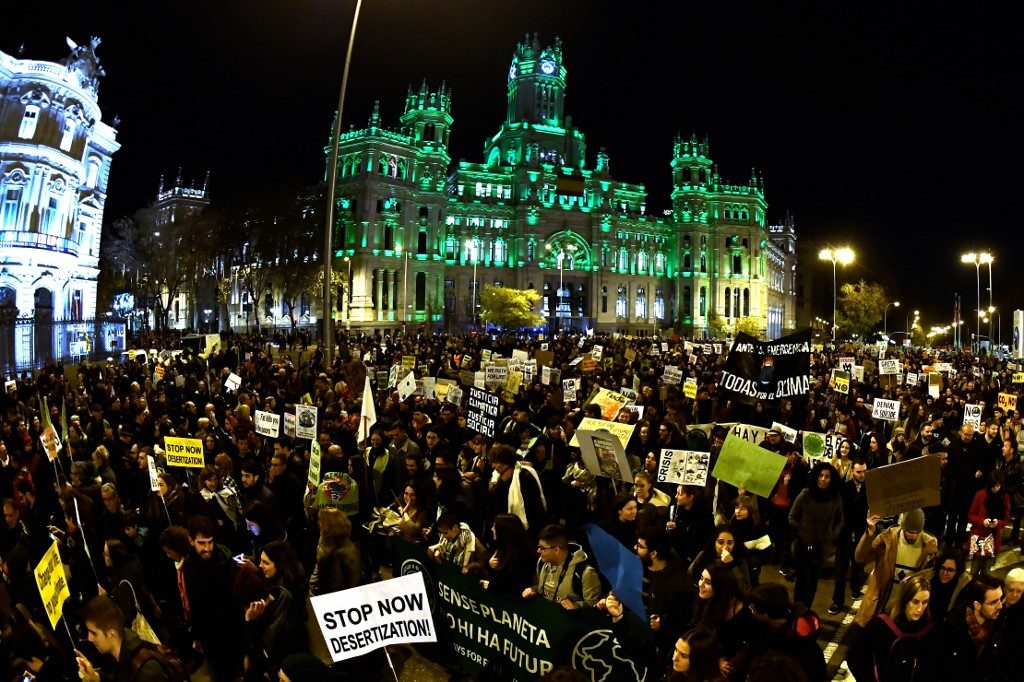SUMMARY
This is AI generated summarization, which may have errors. For context, always refer to the full article.

MANILA, Philippines – Big oil and cement companies may be held legally and morally liable for their hand in climate change and its effects, especially on vulnerable communities in the Philippines, according to the Commission on Human Rights (CHR).
“We have found, based on the evidence presented before us and also our own research, that carbon majors may in fact be held morally liable and legally liable,” CHR Commissioner Roberto Cadiz said on Monday, December 9, on the sidelines of the UN climate summit (COP25) in Madrid, Spain.
He said this was because major oil and cement companies found to have the biggest carbon footprints have played a clear role in climate change and the resulting adverse impacts. Cadiz also said that “we must include in the conversation the role that state-owned carbon majors play.”
He did not name them, but the CHR inquiry looked into 47 private and state-owned companies seen as contributing the most to climate change.
While confident of their moral and legal culpability, Cadiz said that they found it difficult implicating these companies under international human rights law because of possible territorial jurisdiction problems.
He said, though, that international human rights law may “provide a standard” for local courts when pursuing cases, if they take up the CHR’s findings.
Cadiz also added that if the said companies are found to have committed obstruction, deception, or fraud, they could be liable both for violation of civil laws and criminal laws in domestic courts.
The national human rights body has not sued any of the companies since it made its decision, but concluded that victims of climate change effects deserve access to remedies and justice. Cadiz added, “the lack of legal basis, however, does not mean you can go about business as usual… moral responsibility is as strong as legal responsibility.”
The CHR recommended governments to adopt legislation to ensure access to justice for affected communities. He said states must “fulfill their duty under international human rights law [and] create laws and the proper regulatory environment whereby corporations can be held legally accountable for their behavior.”
It also said that signatories of the proposed UN Treaty on Business and Human Rights, which has yet to be adopted, must produce laws that allow climate change victims to seek reparations.
CHR’s declaration on Monday is the result of the commission’s year-long national inquiry on climate change.
A 2015 petition by climate activists called for an investigation into the complicity of big companies in human rights violations as a result of climate change. The CHR concluded its investigation in December 2018.
The 2015 petition read, “The real life pain and agony of losing loved ones, homes, farms – almost everything – during strong typhoons, droughts, and other weather extremes, as well as the everyday struggle to live, to be safe, and to be able to cope with the adverse, slow onset impacts of climate change, are beyond numbers and words.”
This is the first time that a human rights body of any country has said that fossil fuel companies can be legally and morally liable for harms linked to climate change.
“In a sense, this is a legal precedent because this is the first time a human rights commission opened a process to hear this kind of case,” said Cadiz in a February interview with Rappler.
Cadiz also said on Monday that the inquiry found that the current environmental condition in the Philippines constitutes a climate emergency.
“Climate change is upon us and it’s an urgent situation that must be acted upon quickly by all sectors,” he said.
Environment groups hailed CHR’s move, saying that it was about time that big companies were held accountable for their complicity in the adverse effects of climate change on vulnerable populations. – Rappler.com
Add a comment
How does this make you feel?
There are no comments yet. Add your comment to start the conversation.